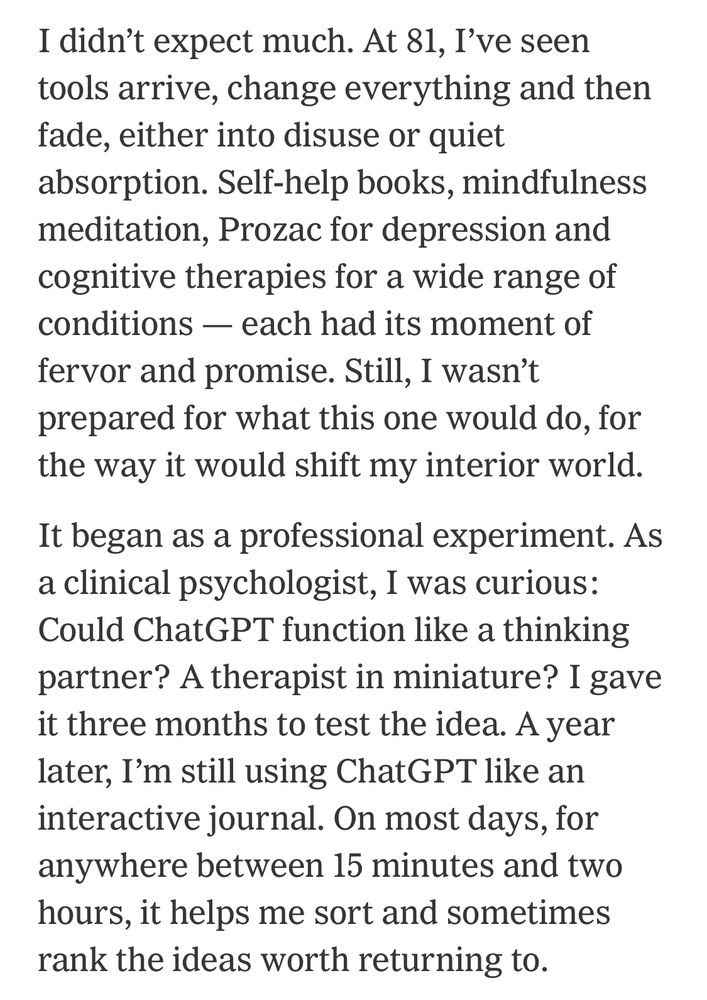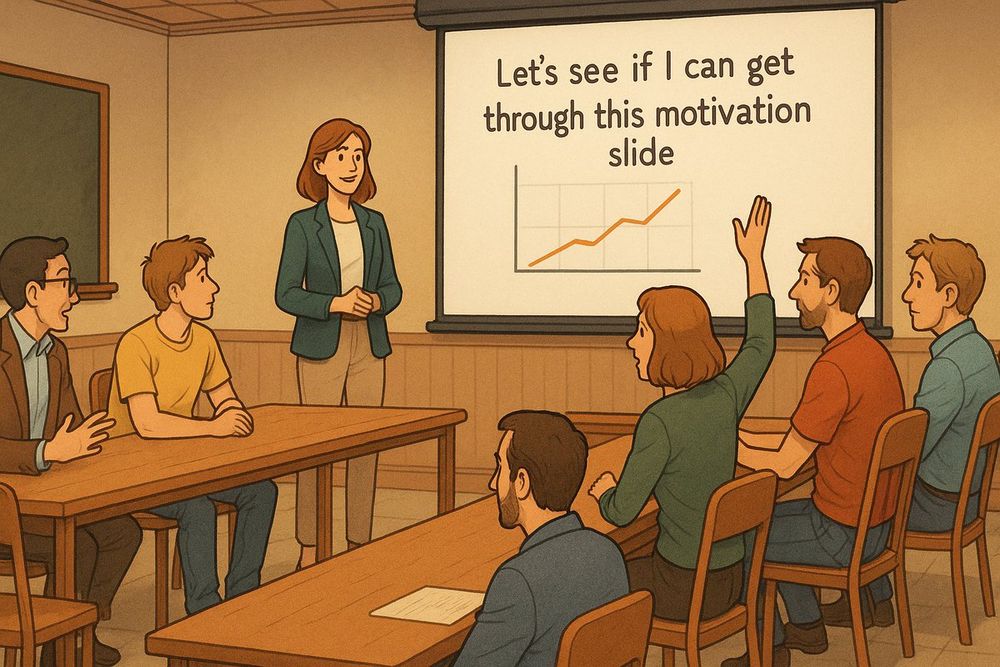The mimicking behavior is also interesting: I listened to Slovak news this morning on the radio and the reporter also said who "is expected to win".
29.10.2025 11:36 — 👍 0 🔁 0 💬 0 📌 0

The video is from July, so "announces" isn't quite right.
Also, a response to that video at the time seems to contain a small hint of paranoia
23.10.2025 19:37 — 👍 0 🔁 0 💬 0 📌 0
Hard to distinguish from opportunism...
23.10.2025 19:07 — 👍 7 🔁 0 💬 0 📌 0
- Will certain people always continue "just asking questions"? Yes.
- But citizens have the right to ask questions and, in a tolerant society, they could ask them without getting mocked
- It's a bad case here, because how could anyone prove a negative? (Can't show "we're not altering the weather")
23.10.2025 19:06 — 👍 0 🔁 0 💬 1 📌 0
Came here to write that but you've saved me the typing
19.10.2025 18:41 — 👍 0 🔁 0 💬 0 📌 0

Liked this passage in @smotus.bsky.social's book - though there are places were non-confusing design is the exception and a cryptic design is the default...
19.10.2025 16:02 — 👍 0 🔁 0 💬 0 📌 0

Opinion | The A.I. Prompt That Could End the World
Latest piece centering scenarios where AI could autonomously develop harmful capabilities like engineering lethal pathogens
But lowering the barrier for malicious actors to cause harm is a risk that's real today
So, of course we get stories about hypothetical risks:
www.nytimes.com/2025/10/10/o...
10.10.2025 19:40 — 👍 0 🔁 0 💬 0 📌 0

On morning Munich commutes, I see surprisingly little tech use. People read newspapers, nap, or chat. Occasionally someone knits, and I watch a bit wistfully.
Kids seem perfectly well-adjusted: those in groups chat and tease each other, those commuting alone do homework or use phones.
08.10.2025 15:15 — 👍 0 🔁 0 💬 0 📌 0

Opinion | We Really Want to Trust Crypto Interests With the Future of Money?
"the crypto lobby is pushing Congress to pass the Digital Asset Market Clarity Act, which ... would bar the Federal Reserve from issuing or even piloting a government-issued digital currency ... without congressional approval" www.nytimes.com/2025/09/29/o...
29.09.2025 21:32 — 👍 0 🔁 0 💬 0 📌 0

Sage Journals: Discover world-class research
Subscription and open access journals from Sage, the world's leading independent academic publisher.
"Acceptance of the scientific consensus was very high in the sample as a whole (95.1%), but also in every sub-sample (e.g. no trust in science: 87.3%) ... [P]eople are motivated to reject specific scientific beliefs, and not science as a whole."
journals.sagepub.com/doi/abs/10.1...
03.09.2025 20:13 — 👍 5 🔁 2 💬 0 📌 0
Motivated reasoning (and responding!) is a huge issue for polling - BUT, the magnitude of the problem also depends on what else is asked within a given survey: www.cambridge.org/core/service...
25.09.2025 22:26 — 👍 2 🔁 0 💬 0 📌 0

I thought GPT-5 was supposed to tone down the flattery 😂
21.09.2025 13:34 — 👍 0 🔁 0 💬 0 📌 0
A friend’s kid told me in 2015: “I can learn anything I want by finding a tutorial on YouTube.”
Did I find it credible? Not quite, but the sentiment was fascinating.
Still think about it sometimes and also wonder how many people now use video-sharing platforms as their search engines
19.09.2025 23:56 — 👍 0 🔁 0 💬 0 📌 0

Very cool that people can be open-minded
03.08.2025 14:09 — 👍 0 🔁 1 💬 0 📌 0

If you've felt that broadcast news is less informative, you're probably right.
Information density of ABC, CBS, and NBC news segments has declined, according to LLM-based classifications: 5harad.com/papers/no-ne...
18.09.2025 15:15 — 👍 3 🔁 0 💬 0 📌 0

Picture of the Vancouver waterfront

Award from the ITP section for my paper with Jan Zilinsky

View from Cypress Mountain
Thanks to the folks at APSA for organizing a great conference, and Vancouver for being a great host city!
cc @janzilinsky.bsky.social
14.09.2025 20:02 — 👍 23 🔁 1 💬 1 📌 0

Axios article headline about Spencer Cox taking a quieter approach
Finally, as I found in research my on nasty politics, elite rhetoric matters—especially from national leaders.
Republican Governor of Utah, Spencer Cox, has sought to reduce the political temperature following the assassination of Charlie Kirk. www.axios.com/local/salt-l...
12.09.2025 23:04 — 👍 8 🔁 1 💬 1 📌 0

The social sciences face a replicability crisis. A key determinant of replication success is statistical power. We assess the
power of political science research by collating over 16,000 hypothesis tests from about 2,000 articles in 46 areas of the
discipline. Under generous assumptions, we show that quantitative research in political science is greatly underpow-
ered: the median analysis has about 10% power, and only about 1 in 10 tests have at least 80% power to detect the
consensus effects reported in the literature. We also find substantial heterogeneity in tests across research areas, with
some being characterized by high power but most having very low power. To contextualize our findings, we survey
political methodologists to assess their expectations about power levels. Most methodologists greatly overestimate the
statistical power of political science research.
The pretty draft is now online.
Link to paper (free): www.journals.uchicago.edu/doi/epdf/10....
Our replication package starts from the raw data and we put real work into making it readable & setting it up so people could poke at it, so please do explore it: dataverse.harvard.edu/dataset.xhtm...
10.09.2025 17:25 — 👍 106 🔁 28 💬 2 📌 6
Used it last year, and wrote a LlooM-inspired article the other day (and could've run the concept through the Lloom infrastructure of course...) goodauthority.org/news/the-eps...
29.08.2025 14:24 — 👍 1 🔁 0 💬 1 📌 0
People in Denmark have varied concerns about tech giants:
- Impact on young people's development (83.5% concerned)
- Role in spreading misinformation (81%)
- Ability to influence public opinion (79.5%)
- Economic power (79%)
- Collection of personal data (78%)
- Impact on social cohesion (75%)
29.08.2025 11:54 — 👍 3 🔁 2 💬 0 📌 0

So why do most of us rarely switch on the airplane mode?
(Not dismissing what the respondents are saying, just wondering what exactly they are telling us about their unhappiness with the current tech)
25.08.2025 15:15 — 👍 1 🔁 0 💬 0 📌 0
Every generation discovers that the latest technology is destroying civilization.
Every generation is wrong.
25.08.2025 10:23 — 👍 2 🔁 0 💬 0 📌 0

Also... close to nothing for a few of these:
24.08.2025 22:34 — 👍 1 🔁 0 💬 0 📌 0
Different AI systems are optimized for different tasks.
Expecting precise instruction following from current image models shows a misunderstanding of their architecture and training objectives:
20.08.2025 07:55 — 👍 1 🔁 0 💬 3 📌 3

I asked 4 AI models to rate the quality of different ideas (all about changing jobs, but for different reasons)
1) Models seems to take users' happiness seriously
2) Gemini flatters users the most, Grok is harsher as an evaluator
3) Overall, it doesn't seem like LLMs were excessively deferential
15.08.2025 12:39 — 👍 0 🔁 0 💬 0 📌 0
True for young adults and for many of us older adults too :)
But right, I should have said I hope 'many will choose the latter'.
As faculty it seems we need to think hard about how we encourage students to use the new tools well
14.08.2025 13:41 — 👍 1 🔁 0 💬 1 📌 0
"Using ChatGPT to write your essays is like bringing a forklift into the weight room"
Not quite.
It's like bringing a fitness trainer to the gym with you; she's *willing to lift weights* for you, but stands ready to give you excellent feedback on your form
It's up to students to choose the latter
14.08.2025 13:27 — 👍 1 🔁 0 💬 1 📌 0

Tried making an image of an economics seminar :)
13.08.2025 14:57 — 👍 0 🔁 0 💬 0 📌 0
How did I miss this amazing news?
Excited to keep learning from your research, Dominka!
11.08.2025 20:58 — 👍 1 🔁 0 💬 1 📌 0
Social scientist | PI of European Research Council (ERC) grant project | Full Professor, Ben-Gurion University in Israel | https://www.jenniferoser.com/
☀️ Assistant Professor of Computer Science at CU Boulder 👩💻 NLP, cultural analytics, narratives, online communities 🌐 https://maria-antoniak.github.io 💬 books, bikes, games, art
Social psychologist into conspiracy theories, jazz, and video games - not necessarily in this order of priorities.
FNRS postdoctoral researcher at the Center for Social and Cultural Psychology (Université libre de Bruxelles).
She/her | First-gen 🎓🏳️🌈 | Postdoc at the Centre for Journalism @sdu.dk | PhD from @ipk-univie.bsky.social | news use & avoidance ❌📰 constructive journalism 🌱🗞️ climate change 🌎 polcom & journalism studies
Assistant professor at @ascor.bsky.social
Crisis communication | legitimacy | EU | text analysis
The European Political Science Society: the not-for-profit professional association for political science in Europe and beyond
https://epssnet.org/
Associate Professor of Political Science. Head of the Social Sciences Department at UC3M
Assistant Professor at the University of Houston researching media and politics.
allisonarcher.com
Assistant Professor of Media Studies and Data Governance at UVA
https://sixfouronea.net/
PhD Candidate in Political Science at the University of Konstanz researching Content Moderation.
🔗 https://mianahrgang.github.io
Social scientist @uc3m @ic3jm.bsky.social & http://pimlab.org | political behavior, misinfo., identity (PI ERC POLARCHATS) | Before: Dartmouth, SIPA, Leiden | Works on 🇮🇳🇧🇷
www.pimlab.org
www.simonchauchard.com
Professor of Data Science and Public Policy | Hertie School Data Science Lab | Elections, Public Opinion, Data
Prof @Oxford, Affiliate @MIT #SocialMedia #Misinformation #Polarization www.MohsenMosleh.com
PhD candidate @oiioxford.bsky.social NLP, Computational Social Science @WorldBank
manueltonneau.com
Professor at Georgetown, research director at KGI. Studying information, politics, health, etc. Also cats, Badgers, Astros, food, gardening.
CSS Postdoc @ Northwestern University
NLP for Violence Research & Mental Health / Misinformation in Science
🌐 https://miriamschirmer.github.io
Technology + democracy.
Visit https://techpolicy.press
Join our newsletter: https://techpolicy.press/newsletter
Opinions do not reflect the views of Tech Policy Press. Reposts do not equal endorsements.
Associate Professor of Health Law, Policy, & Management. Boston University School of Public Health.
Author of Anti-Scientific Americans: https://a.co/d/7oSVhwP
Ethical Legal Societal laboratory focused on the implications of AI for Media and Democracy 🤝 CWI, HvA & UvA #ELSAlab
Assistant Professor of Political Science at Carnegie Mellon Institute for Strategy & Technology (CMIST)
Ohio State PhD. International Security, Political Psychology, Middle East Politics
Opinions my own, don’t reflect employer, etc.


















